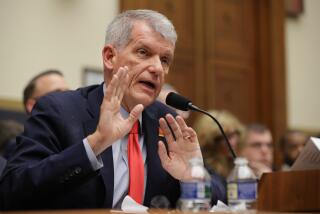SAVINGS & LOAN : Trial Opens for Former Head of Columbia : Courts: Prosecutors portray Thomas Spiegel as greedy, while his lawyers say he lost millions.
- Share via
Federal prosecutors Monday portrayed Thomas Spiegel as an unscrupulous banker who treated Columbia Savings & Loan as if it were his personal piggy bank, but his lawyers said that Spiegel never broke any laws and was among the biggest losers when the Beverly Hills-based thrift failed.
Brad D. Brian, lead attorney for the thrift’s former chief executive, told jurors in his opening remarks that Spiegel personally lost $140 million because of the thrift’s demise, and Spiegel’s family lost about $300 million.
Spiegel and his relatives once owned more than half the stock of Columbia, which was seized by the government in early 1991.
Brian also said that one of the prosecution’s chief witnesses, the owner of a luxury auto dealership who made a deal with the government to plead guilty to two counts of defrauding Columbia, is “a liar . . . (and) a con man” who will testify against Spiegel in an effort to gain a lighter sentence for himself.
“Tom Spiegel did not defraud or steal from Columbia,” Brian told jurors in the Downtown Los Angeles federal courthouse.
The U.S. attorney has filed 45 felony counts ranging from bribery and fraud to misappropriation of funds against Spiegel, who the government claims looted the thrift of millions over a four-year period before he resigned at the end of 1989. Regulators say the bailout should cost taxpayers about $1.2 billion.
“The defendant’s motive was simple: greed,” said John F. Walsh, the government’s chief prosecutor, claiming that Spiegel turned to fraud because he felt that the millions he earned as Columbia’s president and chief executive was not enough to match the earnings of his friend, junk bond king Michael Milken.
The effectiveness of the prosecution’s opening remarks seemed somewhat diluted by Judge Robert M. Takasugi’s pretrial ruling that the term “junk bond” could not be used in front of jurors because it could make them prejudicial against Spiegel. Columbia was once one of Milken’s biggest customers, and its earnings collapsed when the market for the risky securities collapsed in the late 1980s.
With the term banned inside the courtroom, Walsh was forced to refer to the bonds as “high-yield, high-risk” securities. However, he also mentioned Milken’s name about a dozen times in his hour-long opening statement.
Defense attorney Brian, in opening remarks that took about 90 minutes, put much of the blame for Columbia’s collapse on the federal government. He said legislation passed in 1989 forced the thrift to mark down and sell its bond portfolio in a sour market, causing the thrift to become insolvent just one year later.
While the prosecution showed jurors simple black-and-white charts in its attempt to explain Spiegel’s complex business dealings and alleged misdeeds, Brian used a wide-screen television to show color pictures ranging from a chart that depicted Columbia’s explosive earnings growth in the mid-1980s to a photograph of Spiegel and his elderly father, Abraham.
More to Read
Inside the business of entertainment
The Wide Shot brings you news, analysis and insights on everything from streaming wars to production — and what it all means for the future.
You may occasionally receive promotional content from the Los Angeles Times.










